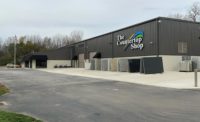
A screw compressor can be effective in meeting the air requirements of larger, continuously operating fabrication shops.
Imagine all the things your compressed air does in your shop. It is used to run hand tools, dry the stone, or run your automated equipment. Many times, compressed air gets overlooked and is sometimes the culprit of costly downtime.
Your compressed air can be the life blood of your shop. It's very important that you feed your machines with good, quality air. You don't want your equipment to break down in the height of your production schedule, nor do you want to replace equipment after a few short years because of neglect of your air system.
Below are some tips that I have shared with fabricators regarding compressed air:
Sizing
When looking at a compressed air system, there are many areas to consider. The first is to determine the size of the compressor that your facility needs. Make sure you have the right system installed to support your operations. You want a system to be large enough so you always have an ample supply of air without overtaxing the compressor. In addition, you want to purchase a system that allows you to expand your facility. There is a fine balance between meeting your current needs and future needs.To determine your current needs, look at the CFM (cubic feet per minute) of air at 90 PSI (pounds per square inch) of all your hand tools. Add this to your machine CFM requirements and add a little for drying stone and any future equipment and tools you may be adding. This number will be your “Total CFM,†and will give you your shop's current air requirements. A good source to find out the required CFM or PSI is the tooling catalogs and your machine manuals.

Every fabrication shop should have an in-line, refrigeration dryer to remove the moisture from the air before it is sent to your equipment.
Type of compressor to purchase
Once you know the approximate size of the compressor that you need, it is time to decide on the style of compressor. There are several different styles of compressors on the market. One of the most common compressors can be found in almost any home garage or small shop, and they are known as the “reciprocating†- or piston type - compressor. This type of compressor is great for intermittent use and is less expensive, but in most cases is less efficient and has more moving parts to wear out.For larger continuous demands, a screw type compressor is ideal. Screw compressors have fewer moving parts and can deliver higher volumes of air more efficiently. They may cost more up front, but in the long run, users recoup that investment in efficiency and production. Screw compressors are typically larger and use efficient three-phase power, thus saving energy costs compared to other types of compressors.
Air quality
Once you have an adequate supply of air, it is then important to focus on the quality of air that you are feeding your equipment. This air should be free from moisture and particulate matter. Every fabrication shop should have an in-line, refrigeration dryer to remove the moisture from the air before it is sent to your equipment. A good dryer will bring the dewpoint down to 37.4 degrees Fahrenheit.
There are several basic types of air dryers on the market. One is the desiccant air dryer that uses a moisture absorbing material to remove water from the air. This type of air dryer does require more attention and maintenance, because the desiccant material can only absorb so much moisture before needing to be replaced.
The other type is the refrigerant dryer. This dryer will cool the air to just above freezing, condensing the moisture in the air that can then be drained away automatically. To remove particulates, a filter element should be installed on your compressor.
Whichever system you choose, make sure the air will be cleaned and dried to your equipment manufacturer's specifications to avoid undue wear and tear on your machinery. The less moisture that is caught in your equipment, the longer the machinery will last. If done properly, you will experience less downtime, and your equipment life will be extended.

Noise
With your hand tools and equipment already running, your shop doesn't need more noise from a compressed air system. For the safety of your employees, consider purchasing a compressor that has a low Db (decibel) rating. Remember, the lower the decibel rating, the quieter the equipment will be.Take a few minutes out of your day today and check your compressor. It will be time well spent.






